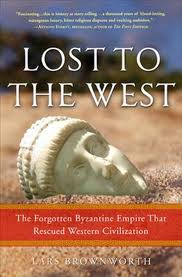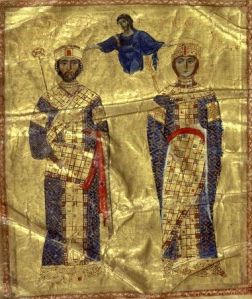When it comes to raising children in the Church, there are many resources available to parents. The Orthodox Church may not have as wide of a variety of books and programs as other Christian groups, but there are still many handbooks, articles, blogs, and (ever-traditional) books to guide parents in how to raise Orthodox Christian children who will be likely to remain in the Church into adulthood. But whether these resources concentrate on micro-issues, such as proper clothing, or focus primarily on major issues such as discipline, obedience, forgiveness, and love, they all are marketed at parents themselves.
When it comes to non-parents in the Church, these resources only offer small sidelines, and it is difficult to find any guide on how to specifically be a good Christian role model for children in the Church. Guides for parents often mention that other adults should step in to help during the service and we as adults are reminded to be aware of the example that we are setting to children, but advice is often left at that.
For good reason, authors usually leave the concept of helping parents intentionally vague. All families have different parenting strategies and all cultures have different ideas of what is appropriate and what is not. In the multicultural world of North American Orthodox Christianity, these boundaries are especially hard to define. Individual parishes may have certain policies regarding children that vary widely – one parish may allow children to play with toys on the floor in the sanctuary, while another down the street might frown upon a mother lying her baby down on a blanket, even if the baby is otherwise quiet. As a result, parents and non-parents alike can feel quite frustrated. Non-parents are especially sensitive to noise from children; parents (particularly mothers) feel stifled in their own worship and in their ability to deal with their children.
Thinking that non-parents in the Church required their own list of guidelines, however, I have decided to compile one based on personal experience and what I have read in materials intended for parents. Like all opinion pieces, however, there will be discrepancies and it is not universally binding. It should also be noted that situations may call for specific remedies and that above all, trust and love and faith in Christ are necessary in determining our relationships with all members of the Church, young and old. It is worthwhile to note that ‘non-parents’ refer to adults of any age, gender, or marital status who do not have children, and the term can also apply to older adults whose children have grown and moved elsewhere.
1. Noise
We must remember that children, particularly young children, are less able to control their voices than adults. (In the case of babies, they cannot control their voices at all.) No matter how loud or distracting children are, they are not trying to hurt us. They are either exuberant or they want attention, the latter of which is often justified in the case of toddlers and always justified in the case of babies. Rather than frowning at the child or their parents, we should foremost thank God that He has blessed us with that child’s presence, and only if the noise persists should we take further action. If we react immediately harshly, the child only learns that members of the Church are grumpy and judgemental. If we react with coddling, we reward a behaviour that we may not want to reinforce.
If a child’s parent is present, discipline should be first left to them. But what if the parents are ignoring their child (something recommended for whiny toddlers in some literature, for example)? What if the parents are seemingly unaware of how distracting their child is to other parishioners? Are we being selfish in intervening? Are the parents being selfish in wanting to stay and continue worshiping? All are being distracted from the service and from prayer. A lot of noise can be detrimental to the congregation at large, especially if it is distracting the readers, choir, servers, and clergy.
The best way to approach this issue from the perspective of a non-parent is not to glare at parents until they take their child out of the sanctuary, but to ensure a conducive environment for a parent to feel free to leave and welcome to return. Particularly if there are multiple children and only one parent in the congregation (something frequently happening with clergy-wives, not to mention single parents), it may be difficult for a parent to leave the sanctuary, and they might only use leaving as a last resort. Offering to watch other children could solve the problem. In the case of a crying baby that merely needs to be consoled, and if one has a close relationship to the family, one could offer to take the baby out instead.
Older children pick up on more of the service that adults often realise. Orthodox worship is responsive and occasionally quite boisterous. Children who are excited might get carried away with shouting “Indeed He is Risen!” and other responses at inopportune times. In such a case, it is usually acceptable to smile and then shush the child silently, regardless of whether that child’s parent is present or not. By doing so, we are indicating that the action is good, but the timing is not. Scolding a child for such a thing can lead to mixed messages.
2. Let Parents Be Parents
While we all have responsibility to raise the children of our parish in the Orthodox faith, we must recognise the boundaries between our roles as spiritual aunts and uncles and the roles of parents. We no longer live in stable communities where we live culturally homogenous lives. The nuclear family is held up in North America as the basic unit of society, and as such, parents expect to be able to raise their children however they choose. Families also move frequently (most children will have moved houses at least once before finishing high school, while many will have moved cities) and as a result, they also move parishes. Naturally, they will be disoriented when faced with a new congregation and its customs. Customs involving children are some of the most varied between parishes: the structure of Sunday School, whether play is accepted, whether or not snacks are allowed, whether or not the rest of the church is child-friendly, the dress code, etc. There is a tendency to assume that what happened at one’s old church was better or normal, so many newcomers are surprised by what they encounter at a new parish. While it may be considered polite to point out “the way we do things here,” it is important to recognise that doing so may not be well-received. (This is something that I have not encountered in literature directed at parents, but it should be!)
However, there are many aspects of a child’s life in Christ that are not exclusively the realm of their parents. Especially as a child grows older, non-parents are sometimes more approachable than parents. We should be mindful that a simple thing like praising a child’s Sunday School drawing can be instrumental in making them feel part of the family of the Church. Having a conversation after the service with a child can both lessen the burden on their parents and make the child feel more welcome. One should take care not to develop an exclusive relationship with any child and to always be open with their parents about your friendship (it is best to be friends with the parents first and the child second). If one is a child’s godparent, one has a more involved role in their spiritual upbringing, but even merely being a spiritual aunt or uncle nurtures a child’s life in Christ.
3. We Are All Role Models
In that we are all a member of Christ and a member of a parish family, we all have the duty to represent our faith to children in our Church. Children are especially observant and they notice when our actions do not match our words; they also notice when we do things that contradict what they believe a Christian is. Sometimes, we and their parents must teach them that they are mistaken, but far more often, they observe us being hypocrites, and they will remember this as they grow up. Not for nothing do many young people, when asked why they no longer attend church, say that they found church-goers to be hypocritical and thus saw no point in going. There are some basic behaviours that we can do to alleviate and prevent such observations.
It is especially difficult for non-parents, particularly young adults, to remember that they are role models for children, and to know what might be troublesome. Behaviour is important – if parents are trying to stress obedience and discipline in their children, seeing adults not exhibiting disciplined behaviour is not encouraging. Children can get the impression that these adults are not “real Orthodox Christians” or that their parents are too strict, which often leads to rebellion later. Dressing modestly and being attentive to worship encourages others to do likewise. Most importantly, we must be mindful of our comportment and actions. Do we follow Christ? Do we strive to be like Him?
Finally, if a parent turns to you for advice about their child, do not hesitate to give it. This often happens when children are older and starting to exhibit qualities that their mother and father are unfamiliar with. A younger non-parent might be more able to relate to their twelve-year-old, for example. As a child grows through the teenage years, it is vital to their Christian life that they have adult role models other than their parents, even if these role models are only in passing every Sunday. They must realise that there are adults, particularly young ones, who are Orthodox Christians and who will embrace them as they become adults. They need to know that they have a home and a family in Christ, regardless of what happens to them after they finish high school and (usually) leave their parents’ home. They will be less likely to seek out a community in the non-Christian world if they know that they have a community in Christ, and even if they do leave the Church, God’s influence through us will remain with them, and they may find their way back to the Church because of it. We cannot know to what extent this influence will be, but that does not mean we can forget how important we are to the children of our Church. God does not make all Christians natural parents, but He makes all Christians a family in Christ, and guardians of our youngest members.
For clarification, this is entirely from my experience and readings as an Orthodox Christian in North America. I realise there are traditions everywhere. I am also not big on quoting from Scriptures or from the Church Fathers. — Katherine Gilks, 2011




 [There is very little else that I can say. Peter was barely conscious of what he said on Mount Tabor and James and John could say nothing.]
[There is very little else that I can say. Peter was barely conscious of what he said on Mount Tabor and James and John could say nothing.] Lord, I thank You for everything and I pray that no matter how much older within Your Church than five I get, I may live my life doing Your Will. Amen.
Lord, I thank You for everything and I pray that no matter how much older within Your Church than five I get, I may live my life doing Your Will. Amen. 
















